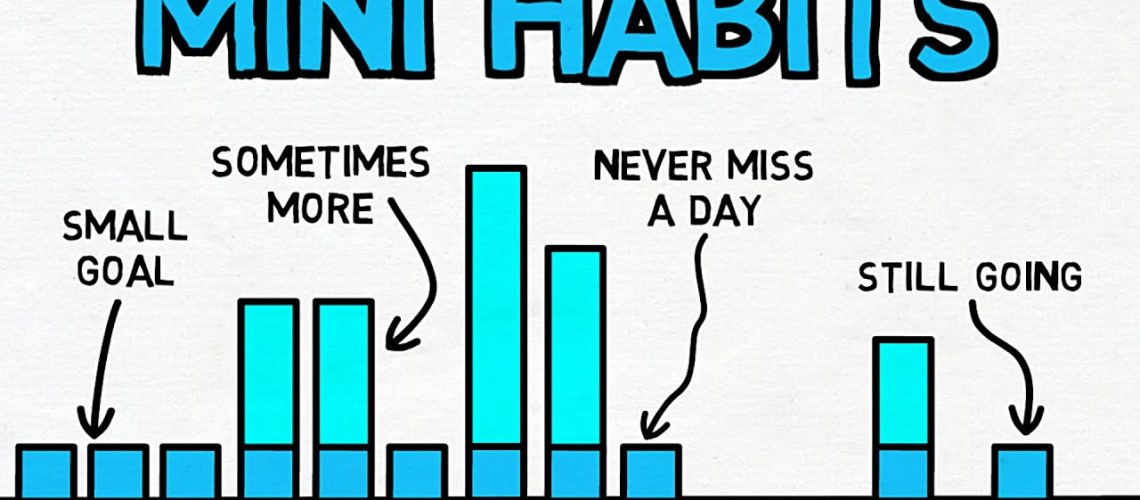What if you made the requirement for a new habit so small you couldn't fail?
A mini habit is a very small positive behavior that you force yourself to do every day; a mini habit’s “too small to fail” nature makes it weightless, deceptively powerful, and a superior habit-building strategy.
Mini Habits will better equip you to change your life than 99% of the people you see walking around on this globe. People so often think that they are the reason they can’t achieve lasting change; but the problem isn’t with them—it’s with their strategy.
You can achieve great things without the guilt, intimidation, and repeated failure associated with such strategies such as “getting motivated,” resolutions, or even “just doing it.”
To make changes last, you need to stop fighting against your brain. When you start playing by your brain’s rules—as mini habits show you how to do—lasting change isn’t so hard.
Videos by Productivity Game & Better Than Yesterday
Key Takeaways
When trying to build an exercise habit or write a book or develop a new skill, most people assume they need to take massive action. Work out for 60 minutes in the morning, write 5,000 words in the afternoon and practice two hours at night, but massive action has a massive problem—it requires motivation and if that action requires motivation you can always find an excuse not to do it.
We are always gonna have days when we’re feeling down—didn’t sleep, well feel sick or just some bad mood—in those days we’ll find an excuse to avoid working out, writing or practicing, but what if we made the requirement for desired behavior so small that there was no valid excuse to skip it?
Three Hidden Powers of Mini-Habits
Mini-Habit Power 1: Post movement Motivation
When you make a tiny movement, you suddenly find the motivation to make another, and, another and, another. Why? One part ego, and one part physics.
Since one push-up is stupid small, as Stephen says because he knew one push-up was well within his abilities, his inner voice challenged his ego by effectively saying, “are you afraid of one push-up…are you really that lazy?”
It was actually easier for him to do the one pushup then walk around the rest of the day with the knowledge that he was defeated by one measly push-up. Once he got down on the ground and did that one pushup, he was in motion and an object in motion remains in motion unless acted upon by another force, which in physics is Newton’s first law of motion.
Start a micro action, then get out of the way and let physics take over.
One Small Step + Desired Behavior = High Probability of Further Steps
Mini-Habit Power 2: Small actions strengthen self-belief which generates a willing to change.
Small actions open the door to bigger changes because small actions reduce fear, and strengthens ones belief in oneself.
Mini-Habit Power 3: Less Effort, Same Result
Building a habit is like riding a bike up a hill. It takes work to get up the hill, but once you reach the top, you can use gravity to roll down the hill effortlessly.
It takes work to build a habit—which can range from 18 to 254 days of effort depending on the habit in the person—but once engrained, it becomes automatic and effortless. In fact, it becomes hard not to execute the habit.
We all have behaviors that we routinely execute, that make us feel weird when we don’t do them. Try not brushing your teeth in the morning, or try not having a shower in the morning, or try not saying your usual greeting when you answer the phone. When you don’t execute these familiar behaviors, your brain effectively says wait why aren’t you doing that?
Our brains love consistency and they get pissed off when a familiar action doesn’t follow a particular cue, but what most people don’t realize is that this feeling, this urge to execute a habit comes from consistency, not quantity.
When you scale back a habit, it’s like you’re retrofitting your bike with a mini motor. It allows you to go the same speed as someone pedaling up the hill, but you’re not breaking a sweat.
The three mini habit powers post movement motivation, increase belief in oneself, and less effort required to ingrain a habit, are what allow a mini habit to produce big results but you’ll fail to see bigger results if you fail to abide by these two mini-habits rules.
Two Mini-Habits Rules
Mini-Habit Rule 1: Make it stupid small.
Set your minimum requirement lower than the lowest possible motivation, so even on your worst days you’ll find the time and energy to do it. Remember the goal is to have no excuse not to do it.
- If you want to build a habit of journaling before bed every night, make the requirement so small that even if you’ve worked 16 hours in the office and dealt with the screaming baby in the evening and didn’t sleep the night before you can still get yourself to do it.
Mini-Habit Rule 2. Be happy with the minimum.
If you intend to do the minimum, but then get angry at yourself for only doing the minimum, there’s a part of the brain that knows that you are trying to manipulate yourself and it won’t fall for the trick. It will resist building the habit.
If you are genuinely satisfied after doing the minimum and make doing more an option, not an obligation, you are more likely to stick with the habit and more likely to produce more by having that choice to do more. You activate a sense of autonomy which is a powerful intrinsic motivator at times when you have more energy than usual.


